When Cait West got on a plane and left behind the Christian patriarchy movement at age 25, she hoped for a clean break.
But years of covering up her body, constantly fearing eternal damnation, being isolated from the outside world and being raised to take over society for God weren’t easy to shake.
“I wanted to focus on fiction writing, but my own story just felt like it was trapped inside of me and I needed to get it out,” West said in a recent video interview.
On Tuesday, that story will be released in the form of her new book, “Rift: A Memoir of Breaking Away From Christian Patriarchy.” Written primarily with other abuse survivors in mind, West’s story is one of navigating a life deprived of agency, surviving complex trauma, embracing her freedom and making space for the fullness of herself. West spoke to media about her decision to leave her religious community, her courtship experience and her discovery that patriarchy isn’t all that fringe. This interview has been edited for length and clarity.
What do you mean when you refer to the Christian patriarchy movement?
The Christian patriarchy movement was in full force in the ’90s and the early 2000s. It’s related to Quiverfull ideology — Bill Gothard, Vision Forum, the Duggars. And it’s very connected through the homeschooling community. God is the ultimate patriarch, and men are his representatives on Earth. The wife submits to him, and children submit to their parents.
Your tax-deductible gift helps our journalists report the truth and hold Christian leaders and organizations accountable. Give a gift of $30 or more to The Roys Report this month, and you will receive a copy of “Baptistland: A Memoir of Abuse, Betrayal, and Transformation” by Christa Brown. To donate, haga clic aquí.
Growing up, I was told I would become a wife and a mother. All my education was pointed toward how to help my future husband, and when I turned 18, I wasn’t allowed to go to college. I couldn’t get a real job outside of the home and I couldn’t go on dates. I was told I would be a child until I got married. I didn’t have a driver’s license or any access to the outside world. I couldn’t decide what my future would look like. I had to follow my dad’s rules for courtship and wait for him to find me a husband. That’s why they called me a stay-at-home daughter.
At what point did you begin to question this religious framework?
I saw my older sister get married through the courtship process, and then struggle with an abusive marriage. They said if we followed these rules, we’d end up happily married. But that doesn’t always happen. I locked that piece of information away.
I had my first courtship when I was 20. My father mediated all our main conversations, so I didn’t really get to know him personally. But I thought I was going to marry this person, and then my father ended the courtship because he didn’t think he was the right person. I had no say and I was devastated. My father told me it was sinful to for me to be heartbroken and to feel affection for this person. Something inside me said that’s a lie, it can’t be true that my feelings are sinful. That’s when I started to wake up to my reality.
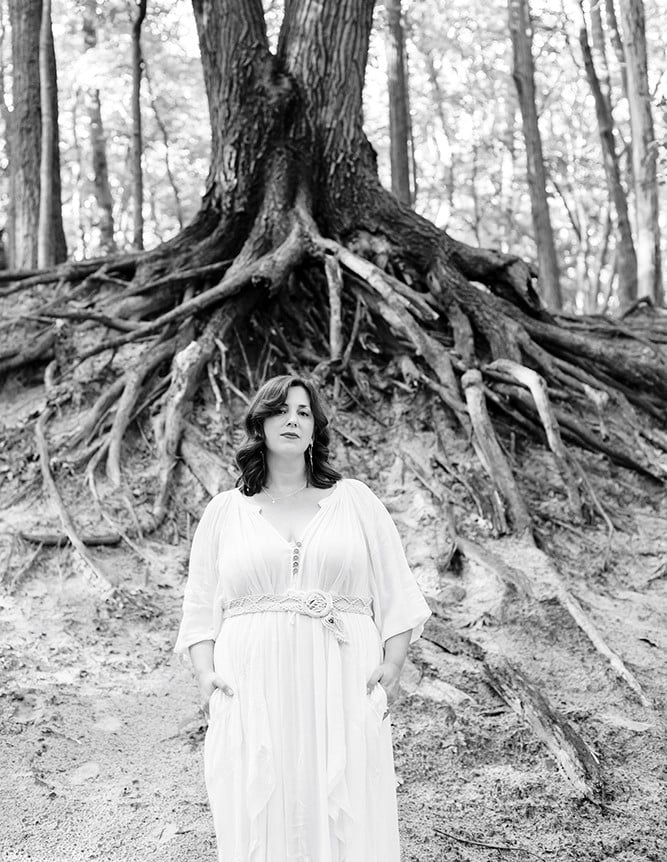
How did your experience with courtship shape the way you came to view love and intimacy?
From before I hit puberty, I was told I wasn’t supposed to fall in love until I was betrothed. I’m somewhat of a hopeless romantic, but I had to repress that side of me because that was not allowed.
When I had that first courtship, it changed how I stood up for myself, because I realized my father could just keep me at home forever if he decided to. And so I decided if I fell in love with somebody else, I wouldn’t let my father stop me from having a relationship. And that’s what happened. I had a second courtship, but my father ended that after a week. We continued to have a relationship outside of his permission, and that’s the person I eventually moved out to get married to. And so that is the big rift in my book, where I’m leaving my family.
At that point, I was throwing all the rules out the window about what relationships should look like. I realized I didn’t have a good example in my parents’ marriage, I didn’t think that courtship worked very well, and I just wanted to be with the person I loved.
What ultimately led you to move on from church altogether?
When I left my family, I wanted to hold on to the religion I had been brought up in. I came to believe that what my father was saying was not who God was, and I went to church for quite a few years. But over time I saw red flags. The church was complementarian, when men and women are seen as having different roles of equal value. It seemed clear to me it was still patriarchal, because all the leadership positions were held by men. At one point, I wanted to write resources for the church about spiritual abuse, and they asked me to get my husband’s permission.
A new associate pastor started sharing books by patriarchal leader Doug Wilson, and when I brought up my concerns, nobody seemed to think it mattered. The senior pastor told me adults could discern for themselves. With the Trump presidency, I saw an increase in Christian nationalism in the church, and I started getting panic attacks in church again. I realized, this isn’t a good place for me. I tried to make changes and speak up, but it didn’t seem like anyone really wanted to receive that, and so I eventually left.
How do you think about spirituality these days?
I stopped believing in a patriarchal God first, and then I stopped believing in a wrathful God. And then I started just questioning, is there a God? When people push me to pick a label, I usually say agnostic because I feel open to the idea that I don’t know everything. But I do believe there is something that connects all of us humans together. And I know that, for me, the closest I’ve experienced a higher power is when people unconditionally love each other. To me, that’s more important than choosing doctrine over people.
Can you discuss the geological or ecological interludes interspersed throughout the book?
I knew from the beginning I didn’t want to write a book that just told my story chronologically. My memories aren’t chronological, and I think that’s common for people who have experienced trauma. I’m fascinated by braided narratives, where several different storylines are woven together to create a new meaning.
Throughout the whole book, I include the geological story of all the places I’ve lived. Part of that is to provide a bigger metaphor to explain how I feel about what happened. It was also a grounding practice to write about geology, the cosmos, and compare it to my little life.
How do you see your experience of growing up in the Christian patriarchy movement in relation to the broader Christian landscape?
I used to feel like my family’s way of life was very fringe. But now that I’m out, I see patriarchy in many churches in the U.S., just in different flavors. When it’s subtle, it can be more problematic, because it’s not easy to directly address. But the extreme still exists, stay-at-home daughters still exist. It just doesn’t use the same terminology.
Also, spiritual abuse and emotional abuse can happen in any community, including liberal churches. It is easy to point fingers at the extremes and not look at yourself, but I would hope people can take stories like mine and examine how this might be happening in their own communities in different ways.
 Kathryn Post is a reporter for Religion News Service based in Pittsburgh, Pennsylvania.
Kathryn Post is a reporter for Religion News Service based in Pittsburgh, Pennsylvania.






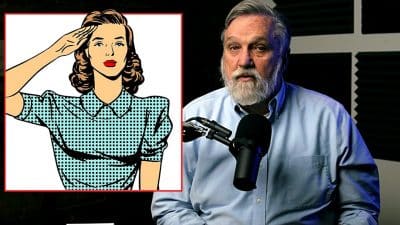

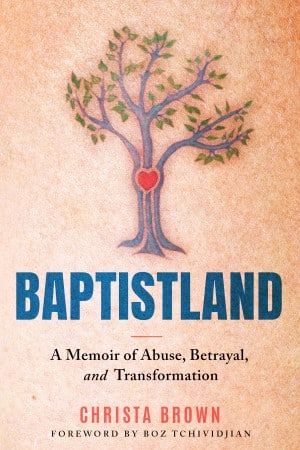
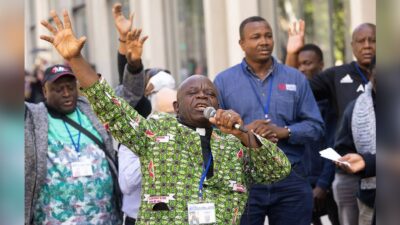
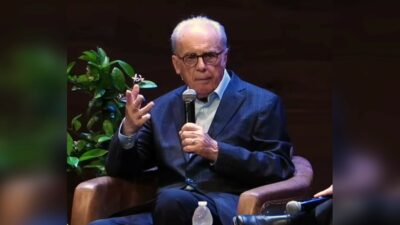
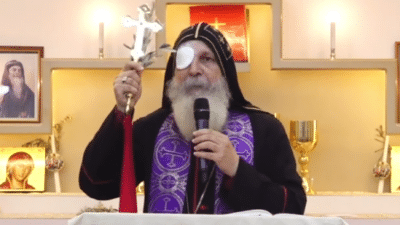









22 Respuestas
It sounds like Ms. West not only broke from Christian Patriarchy, but from Christ. I am sorry to hear that and I pray she will find healing and return to the Scriptures and become a true follower of Christ. I’ve found that it is not that uncommon for those who were led by the Gothard Movement to escape and in the process “throw out the baby with the bathwater.”
It is response like this that drive people from the church. Your spiritual arrogance is bleeding all over you
She has been through Hell and you know whether she has been saved or not. Only one get’s to determine whether she is a believer or not. It is not you. Does all of what she has to say offend you because she is a woman?
Better headline:
“In ‘Rift,’ Author Cait West Talks Breaking Free from Christianity.”
I hope Cait West is eventually saved and experiences the REAL relationship God has wanted with her, even before she was born.
Probably having been taught about all the “churches” that were wrong, perhaps this author has not ventured very far from her roots denominationally due to implanted prejudice.
I hope she will eventually be able to begin seeking for The Lord with all her heart (again) for His healing.
She actually appears to have experienced some amazing growth and healing in the path she has followed. I admire her for her courage on this journey she has embraced. It sounds like she is a genuine truth-seeker.
It is response like this that drive people from the church. Your spiritual arrogance is bleeding all over you
Before I read the comment by “Charles Dickens” , I said a prayer. “Jesus let her find you, to not throw the baby out with the bath water. ” But if Cait is a seeker, Jesus promises if one sincerely knocks, seeks and asks, it will be given. When I read the Gospels, I don’t see patriarchy in Jesus. Think of all the encounters, divine appointments with women that throw patriarchy out. In fact it seems to me, outside of the 12, Jesus had significant, life changing encounters with women and girls where all forms of healing took place. The Chosen provides wonderfully, creative, inspired back story. I If Cait reads these comments, please consider viewing this series. I’m glad she broke free of such traumatic control. But Jesus is not like this.
Describe Christian Patriarchy – “God is the ultimate patriarch, and men are his representatives on Earth. The wife submits to him, and children submit to their parents.” …….. so the clear teaching of the Bible. Just because some men may abuse their authority doesn’t make the teaching that wives should submit to their husbands and children to their parents any less biblical. I’m always surprised when I see stories like this on the Roys Report, considering Julie Roys is supposedly a Complementarian.
Something to consider, biblical directives didn’t present themselves out of a vacuum. If women were directed to submit to their husbands, it indicates women were behaving in inappropriate, domineering, and contentious ways that were disruptive to the gospel and its influence. It’s not appropriate for men to behave this way either, thus the command to submit to one another in Christ. When we unpack the meaning of love and treat each other accordingly, these issues largely resolve themselves.
No, it doesn’t indicate that at all. It indicates that the Lord has a design for marriage and in that design women are to submit to their husbands. Yes, the husband is also called to love and lay down his life for his wife, but that doesn’t make the first part of the verse any less true.
The fundamental ethos of Christlikeness is to put the other above self, not to lord over others. I mostly fear the immature husband who weaponizes scripture to engage in un-Christlike behavior while labeling it “biblical.” Coerced submission isn’t love, it’s oppression.
Fine. Yes. Definitely true. I’m married and try my best to love my wife and put her first. My whole point is that the Bible does teach that wives are to submit to their husbands and that children are to submit to their parents.
The problem relates to what is LEFT OUT.
Namely, verses 21 and 23!
“Submitting yourselves ONE TO ANOTHER IN THE FEAR OF GOD.
Wives, submit yourselves unto your own husbands, as unto the Lord.
For the husband is the head of the wife, even as Christ is the head of the church: and he is the saviour of the body” (Ephesians 5:21-23)
Likewise in the verse cited below.
Problems of control, manipulation and dominance (which are the opposite of Christ-like and are actually demonic) arise when the CRUCIAL point that men are to be submitted to Christ is left out.
Being in true submission in character as well as practice (i.e not blithely ignoring Matthew 20:25-28 & 1 Peter 5:3) creates a humble, loving and meek man. NOT a controlling one.
“But I would have you know, that the head of every man is Christ; and the head of the woman is the man; and the head of Christ is God” (1 Corinthians 11:3).
I agree with everything you wrote. Men should be humble, loving and meek. My point is to say that the section where the author describes Christian Patriarchy, is for the most part biblical. The problem is, one: men have abused this God given authority, and two: Western culture is very egalitarian and despises any sort of submission on the part of women/wives. Unfortunately that egalitarianism has taken over many churches.
Heads up for anyone trying to get out of these abusive patriarchal systems… just heading to a “complementarian” church that is a cog in the wheel of the Evangelical Industrial Complex is not enough. There are egalitarian churches and denominations, head there.
Otherwise, it’s just a kindler gentler, and still abusive, and still oppressive, patriarchal system.
Sad that she didn’t end up in a UCC or UMC or other mainline church that celebrates and affirms women in every level of leadership. We are certainly not perfect, but she would have had a different experience.
We raised ten children in the 80s and 90s using biblical standards. We homeschooled them and kept them active in church their entire youth. The were saved at an early age and all married Christians. I admire their walk with God and their children’s.
We did not tell them who to marry, but they always sought approval of their choices.
We instilled a biblical foundation about family, sexuality, and marriage, and we trusted them to make the right decisions. They did. Their homes are one where the husband is the head and the children obey the parents. The peace and harmony in those homes are a rare thing today
I too am sad that our despicable treatment of her contributed to the loss of her faith. There is, however, so much that we can learn from her story, and others like her. That is, of course, if we are humble.
Whatever church and spirituality West experienced thanks to her parents, it wasn’t Christian. The kind of patriarchal bondage she describes is reminiscent of the perverse 17th/18th/19th century Christianity that treated women and all POC as chattel and subservient to even the most ignorant and depraved white male. Way back in the ’70s my now -ex (now deceased) insisted we attend a Basic Youth Conflicts conference. It was not just awful, but disgusting. My hope is that West finds a Christian church that preaches a Gospel that is free of politics, patriarchal bondage, and experience genuine freedom and discipleship found in Jesus Christ. HIS yoke is easy, HIS burden is light. Matthew 11:28-30.
Thanks for your great courage, and being willing to face isolation, fear, and intimidating lies to live and share your story, it is unimaginable what grief and trauma must be overcome in these religious abusive family and church systems. I’m thankful for the work of Roy’s Report to give space and attention to spiritual abuse in all its forms and other toxic systems.
Based on the author’s description of her upbringing, it sounds like her parents were wildly over protective and used scripture to justify it. I will say, in the spectrum of abuse, hers seems to be on the lower end, and while I never want to minimize suffering, it strikes me as a bit of an extreme reaction to cut off your family over. Beyond the obvious observation that her parents were overzealous in their protectionism and that it did her much harm, the thing that disturbs me is that her wound is not causing her to look more towards Christ for healing and reconciliation with her family, but more towards an aggressive sense of aggrievement and victimhood. This may just be the phases of grief that hopefully eventually leads away from a mindset that sees everything through the lense of what she experienced, seeing bogeymen in every corner, to a place where she can have honest, two-way conversations with her family. Understanding that in some cases family cannot be reconciled with due to ongoing actual abusive behavior and unwillingness to repent. Nothing in how she describes her parents would lead me to believe them as total lost causes.
West is actually very gracious in her book in how she portrays her upbringing. Unlike many memoirs, she does an excellent job at encapsulating what this experience was like without being aggressive or intense. Instead of judging, I think we Christians would do better to listen and learn with humbleness and repentance. The church in which she grew up was indeed a cult that used the name of Christ to justify all sorts of “unchristian” behavior. As one who knows the “inside” story, she is not playing victim or overreacting. She was indeed totally controlled by her family and church. Like many in the ultra conservative homeschool movement, she has overcome a lot of odds to get an education and make a life for herself with a healthy and supportive spouse. That is quite the accomplishment.